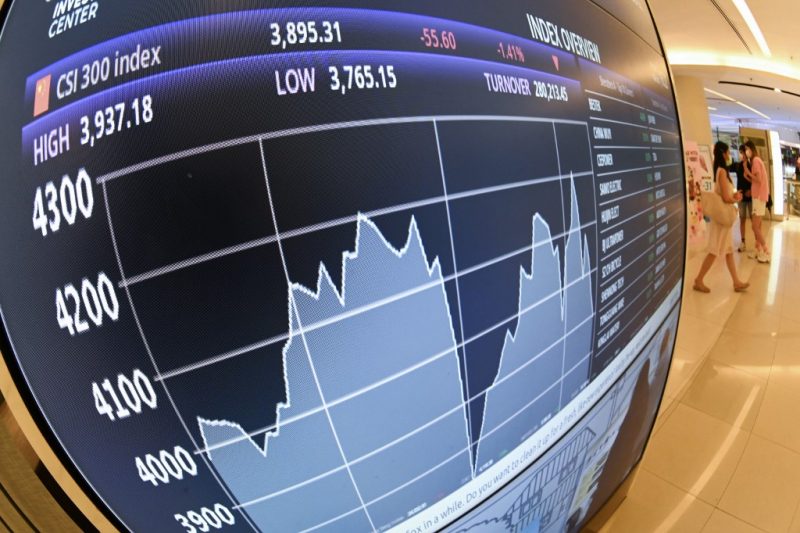Asian shares staged a recovery on Thursday after softer-than-expected US inflation data prompted bets of less aggressive rate hikes from the Federal Reserve.
The not-so-negative US consumer prices lifted Wall Street, with the momentum rippling through Asian exchanges and into Europe in early trading.
MSCI’s broadest index of Asia-Pacific shares outside Japan – which was closed for a holiday – surged 1.4% to the highest in six weeks, buoyed by a jump in Hong Kong, advancing South Korean shares and gains in China’s blue chips.
Also on AF: Indian Firms Using UAE, Asian Currencies to Buy Russian Coal
China and Hong Kong sentiment was also aided by a sharp rebound in Chinese property shares, after Longfor Group Holdings denied rumours that it had missed payment on commercial paper.
China’s blue-chip CSI300 Index rose 1.5% in the early session, while the Shanghai Composite Index gained 1.6%, or 51.65 points, to 3,281.67.
The Shenzhen Composite Index on China’s second exchange was up 1.7%, or 36.15 points, to 2,216.98.
Hong Kong’s stock benchmark Hang Seng bounced back after falling to three-month lows in the previous session. The Hang Seng Index rose 2.4%, or 471.59 points, to 20,082.43.
“The slower place of US rate hikes is good news for growth stocks such as major Internet firms,” Linus Yip, chief strategist at First Shanghai Group, said.
Shares of Alibaba gained roughly 3% in Hong Kong, despite plans by SoftBank Group to slash its stake in the Chinese tech giant. Investors were relieved that the Japanese conglomerate will use a derivative called “prepaid forward contracts,” rather than directly selling shares in the market. The Hang Seng Tech Index jumped 2.7%.
Elsewhere across the region, the Philippines jumped more than 3% in its best session since October, while Malaysia, Indonesia and Taiwan rose between 0.7% and 1.7%.
Indian stocks gained with Mumbai’s signature Nifty 50 index up 0.7%, or 119.70 points, at 17,654.45.
World Exchanges Lose $18 Trillion
Globally, shares edged higher as investors bet on the pace of interest rate hikes slowing after data pointed to inflation peaking, leaving the dollar struggling after its biggest fall in five months.
Figures on Wednesday showed that US consumer prices were unchanged in July compared with June, a two-year rise in inflation stopped in its tracks by a drop in gasoline prices.
Investors eyes now turn to US producer prices data, along with the latest jobless claims numbers, ahead of Wall Street’s open.
Michael Hewson, chief markets analyst at CMC Markets, said peaking inflation could mean less aggressive interest rate hikes from the US Federal Reserve when it meets in September. The Bank of England and European Central Bank also meet next month.
“Markets are getting ahead of themselves, and really it’s not just about the fact that inflation has peaked, but how far can it fall given the current environment,” Hewson said.
“If you look at the problems that are still playing out across Europe with supply chains and gas prices, all it means is that prices will settle at a much higher mean rather than going back to 2%,” Hewson said.
The World Federation of Exchanges said $18 trillion had been wiped off global markets in the first half of 2022, a 15% drop in stock market capitalisation, as the global economy tries to recover from Covid-19 and deal with fallout from war in Ukraine.
Overnight on Wall Street, the S&P 500 rose more than 2%, while the Nasdaq Composite added 2.9%. The Nasdaq has now gained more than 20% from its June low.
Oil prices eased as traders shifted attention back to more supply of crude entering the market coupled with weaker demand. Brent crude futures fell 0.1% to $97.27 a barrel, while US West Texas Intermediate crude futures fell 0.1% to $91.83.
Key figures
Tokyo – Nikkei 225 <> CLOSED
Hong Kong – Hang Seng Index > UP 2.4% at 20,082.43 (close)
Shanghai – Composite > UP 1.6% at 3,281.67 (close)
New York – Dow > UP 1.6% at 33,309.51 (close)
- Reuters with additional editing by Sean O’Meara
Read more:
India Shares Hit Four-Month High, Banks and Tech Lead
Shares of China’s Longfor Rebound as Developer Denies Default
























